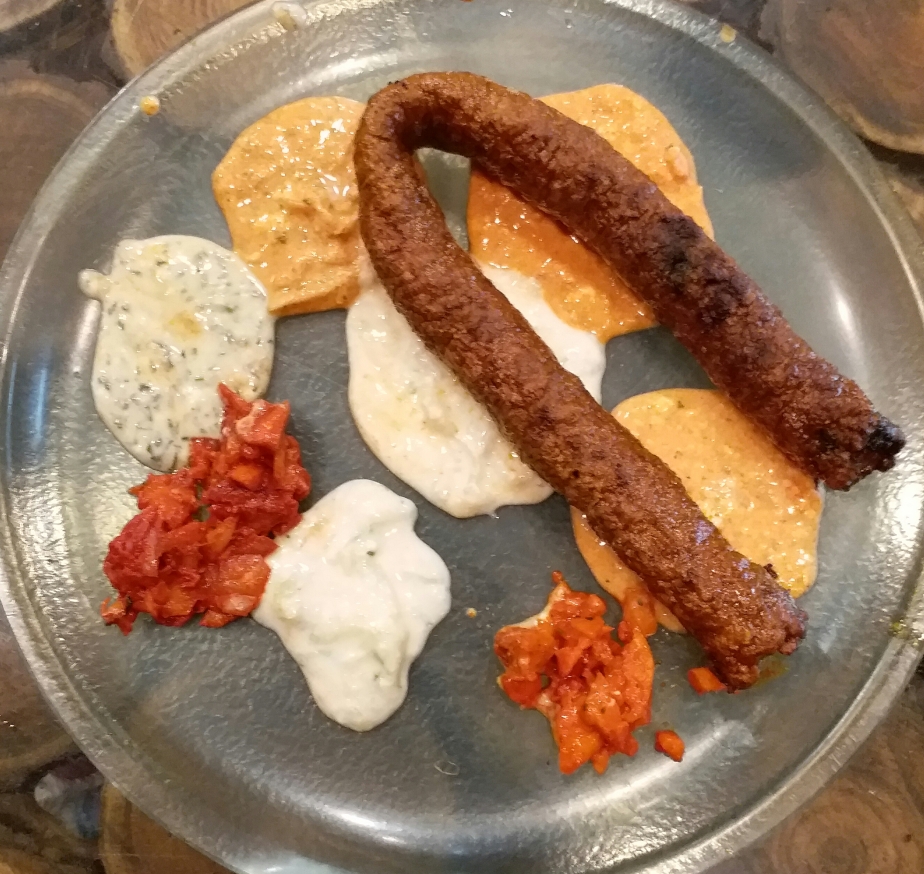A delayed flight had left me feeling rather weary, with the agonisingly long layover in the capital compounding the fatigue. But the pleasant early autumn nip in the air and the prospect of Tujj were too alluring to spend the evening cooped up in a hotel room.
The street leading to Khayaam Chowk is lined with stalls selling the Kashmiri version of BBQ. Pitmasters fanning the grills with the flamboyance and laidback confidence of cowboys in Westerns. The clouds of smoke wafting from the incessant stoking of embers carry with them the heady fragrance of grilled meat that rises like a lasso hooking unsuspecting passersby. The noose tightens as you make a meek and futile attempt of resisting, before giving in to the delicious fate that awaits.
I was warned of this path paved with temptation, so I ignored the initial distractions and continued with the resolve of Indiana Jones retrieving the Holy Grail. Yes! Imran’s at Khayyam Chowk is exactly that – The Holy Grail of Kashmiri Tujj!
“Tujj?” is the ‘open sesame’ to this cave. The sliding door of the tacky facade opened to a smallish cabin packed with as many tables as it could hold, with just enough space between them for the servers to navigate the maze like Pac-Man.
I sat at the only vacant table as a smiling waiter approached me. “Kebab aur Lavasa”, I said trying to muster the matter-of-fact tone of a seasoned Tujj connoisseur. Inside I was giggling like a child about to open his birthday present, knowing only too well the surprise the parcel held.
The Kashmiri Kebab is nothing like the mutton seekh kabab most of us are used to. Not only is the flavouring distinctly Kashmiri, but the texture is also unique with a springy chew and bite. Pounding of the meat with a good amount of lamb fat makes it extremely pliable and when expertly made, it bends elegantly like a pair of nunchucks in the hands of a Tai Chi master (as seen in the picture).
It is served with an array of over half a dozen chutneys and condiments, ranging from the sharp and pickley to the rich/mellow and creamy. The accompanying Lavas is slightly chewy and provides the perfect foil for the rotisserie meats.
I hastily took a picture to get the social media pleasantries out of the way and proceeded to make light work of the ‘Kebaba’. Only when I looked up to place my next order did I notice what a motley bunch I was surrounded by! A group of very vocal and visibly happy migrant labourers sat at the far end. In another corner, a doting uncle was treating his nephews to their favourite Tujj. Locals seemed to whiz in and out of the place, not letting small talk distract them from the job at hand, using torn pieces of Lavasa like a mitten to pinch chunks of smoking hot meat straight off the skewers. I should have stuck out like a sore thumb, and I was afraid I would. But this is the most comfortable and welcomed I have felt amongst complete strangers.
“Fish lenge, Sir?”, asked my smiling server, anticipating a no for an answer. “Haan” I replied. “Aur ek mutton Tujj bhi laiyega please”, I added, certain that the fish would be average at best.
The grilled fish that arrived looked covered in a thin batteresque crust, reiterating my doubts. I reached for my phone, only to realise that the battery was drained of all the juice and it had died on me.
As I took the first trepidatious bite, all my doubts and reservations vanished into thin air as I was transported to cloud nine. A paper-thin crust, perfect seasoning, brilliantly balanced flavouring with just the right amount of ground cumin earthing the ethereally light, clean taste, with no trace of any fishiness whatsoever (I later learnt it was a freshwater fish from the local water bodies in and around Srinagar). And the cuisson on the fish was sublime. The meat; tender and juicy. The kind of juicy Blumenthal would flaunt, squeezing the succulent fish as juices gushed out of the glistening flesh. And all this achieved on an open, coal-fired grill when the difference between perfectly cooked and dead is a few seconds.
By now I wanted to shoot a similar video and was furious with myself for not having charged my phone. I felt like Gogol from Mira Nair’s cinematic adaptation of Jhumpa Lahiri’s ‘The Namesake’, where Ashoke walks little Gogol to the end of a pier, only to discover that he has left the camera in the car.
Maybe this was the universe telling me it was a moment too special to be diluted or even contaminated by the superficiality of clicking pictures. “All this way and no picture?” “You will have to just remember it then”. “How long will I have to remember it?”.
“Remember it always! Remember…that you and I made this journey to a place from where there was nowhere else to go.”
PS – For the records, after the epiphanic Gaad (fish in Kashmiri), I polished a plate of exquisite Lamb Tujj, before ‘riding off into the sunset’.

